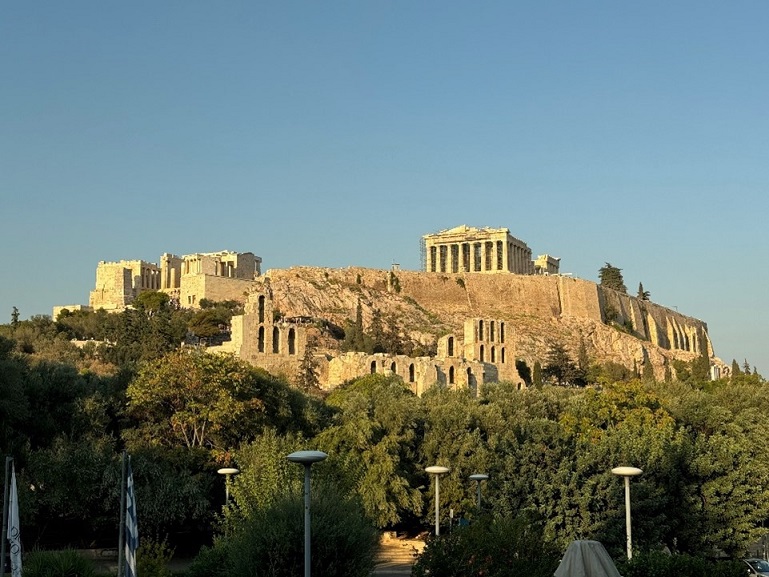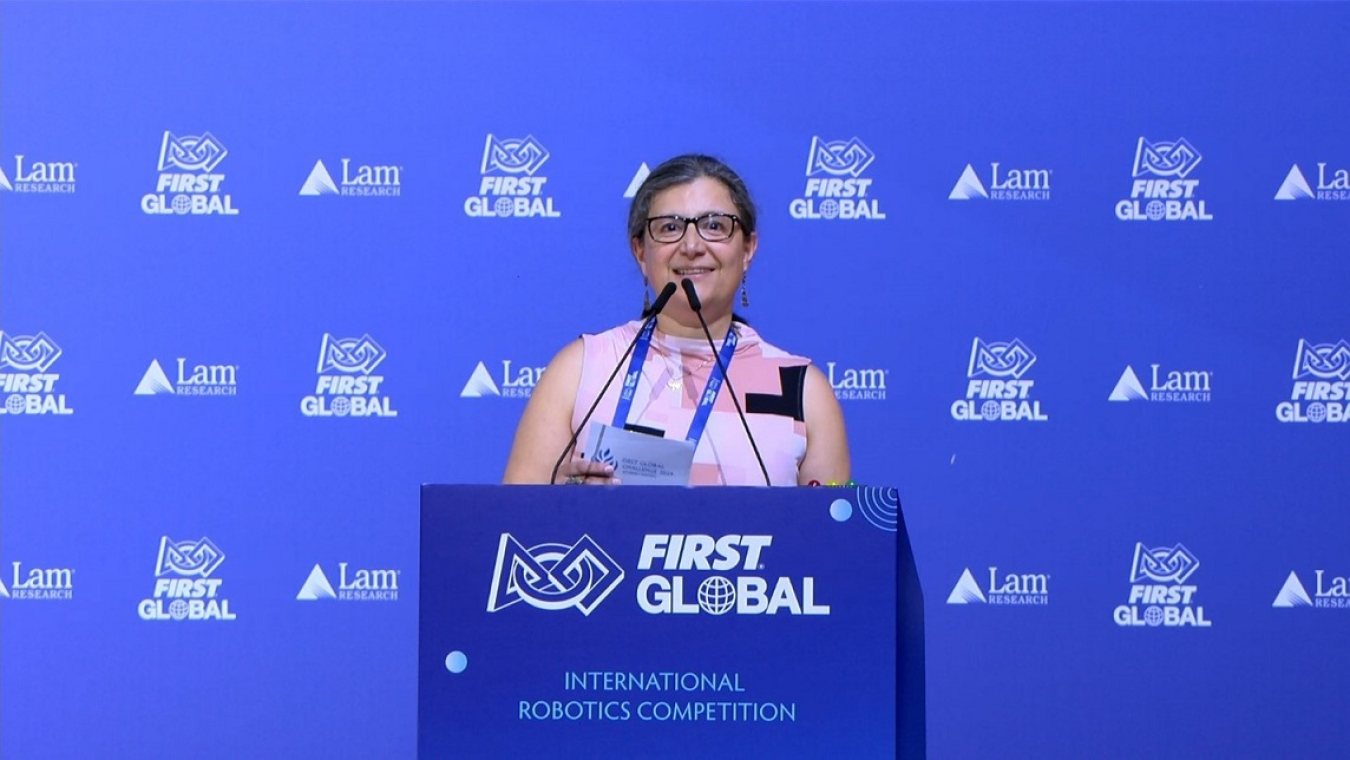The U.S. Department of Energy Bioenergy Technologies Office (BETO) joined students from nearly 200 countries as a sponsor of the FIRST Global Challenge, an Olympic-style international robotics event in Athens, Greece.
November 21, 2024Inside the FIRST Global International Robotics Event

The U.S. Department of Energy Bioenergy Technologies Office (BETO) joined students from nearly 200 countries as a co-sponsor of the FIRST Global Challenge, an Olympic-style international robotics event in Athens, Greece.
DOE Co-Sponsors FIRST Global Challenge 2024: Sustainable Food Systems
The challenge? Nations had to send a team to build and program a robot to compete in a game themed around one of the greatest challenges of the 21st century facing our planet: sustainable food production. For the eighth edition of the FIRST Global Challenge, teams gathered at the Panathenaic Olympic Stadium and the Peace and Friendship Stadium to compete under this year’s theme titled “Feeding the Future.”

During the competition, teams learned about the challenges and opportunities to provide the global population with safe, nutritious, and environmentally responsible food. Individuals from diverse backgrounds, cultures, and experiences were brought together to learn how the sport of robotics unites to solve the world’s critical challenges through science, technology, engineering, and mathematics (STEM) innovation. Students learned about the complexity of our global food system and how interconnected factors such as renewable energy are critical to balancing resources to support a sustainable food system.
A core FIRST Global value is grounded in the belief that “while politics often divides, technology unites” and BETO supports the FIRST Global Challenge for its focus on technologies for a sustainable future. BETO recognizes the need for sustainable energy sources to coexist with sustainable food production without increasing barriers to food security. Alejandro Moreno, DOE’s Associate Principal Deputy Assistant Secretary for the Office of Energy Efficiency and Renewable Energy said, “We are proud to support FIRST Global and their efforts to inspire the next generation of scientists and engineers to lead the effort toward a more sustainable energy future."
Bioenergy 101: A Sustainable Energy Source
The growing global demand for sustainable food production coincides with the rising need for environmentally responsible energy. BETO supports the transition to a clean energy bioeconomy through research, development, and demonstration to enable the sustainable use of domestic biomass and waste resources to produce biofuels and bioproducts. Bioenergy technologies can help decarbonize the transportation sector focusing on aviation, marine, rail, and heavy-duty long-haul freight industries, while mitigating greenhouse gas emissions to combat climate change.
Biofuels can be derived from dedicated, non-edible energy crops, such as switchgrass, miscanthus, willow, and pennycress. Other types of biofuel feedstocks include microalgae and macroalgae, forest biomass such as logging residues, municipal waste, and agricultural residues, including post-harvest crop waste like corn stover—the waste byproduct of corn.
The U.S. currently uses about 342 million tons of biomass from these sources, as well as corn grain for ethanol and wood/wood waste for heat and power, to meet roughly 5% of the nation’s annual energy demand. According to BETO’s 2023 Billion-Ton Report (BT23), in the future, the U.S. can triple the production of biomass, which can produce an estimated 60 billion gallons of low greenhouse gas liquid fuels, while still meeting the projected demand for food, feed, fiber, conventional forest products, and exports. The analysis ensures sustainable outcomes by accounting for potential risks to soil, air and water quality, water availability, and the imperative to protect America’s forests and biodiversity.
A robust bioenergy industry will generate a variety of U.S. jobs across several sectors, from farming and trucking to microbiology and chemical engineering. Bioenergy and bioproduct production have significant potential to serve as a vehicle for domestic job creation and economic opportunity for communities throughout the nation. Expanding the domestic production of sustainable biomass supports the whole-of-government approach to achieving net-zero emissions by 2050 and strengthening U.S. international leadership in clean energy.
Preparing the Next Generation STEM Workforce
BETO is advancing economic development through careers, education, and training opportunities available to meet the needs of a growing bioenergy workforce. BETO’s AlgaePrize 2023-2025 Student Competition promotes industry-driven education, training, and workforce development by encouraging students to pursue innovative ideas for the development, design, and invention of technologies within the commercial algae value chain. Fifteen finalist teams from schools across the U.S. will present their research projects to a panel of judges during the AlgaePrize Competition Weekend, April 11-13, 2025, at NREL in Golden, Colorado.
BETO is also a sponsor of the upcoming FIRST Robotics Chesapeake First Tech Challenge Events hosted by FIRST Robotics Chesapeake, spanning across the District of Columbia, Maryland, and Virginia. Middle and high school students will be challenged to design, build, program, and operate robots to compete in a head-to-head challenge in an alliance format November 23 – 24, 2025, in Washington, DC.
Dr. Sonia Hammache: An Insider View
BETO’s partnership with FIRST Robotics is an important collaboration in supporting STEM innovation and creating career pathways in clean energy, and sponsorships with FIRST Robotics Chesapeake and FIRST Global serve as critical collaborations. BETO’s Dr. Sonia Hammache, Technology Manager for the Conversion Technologies program, was able to attend the FIRST Global event to present an award and received a first-hand look at the importance of sustainable energy technologies on minimizing the impact of energy production on global food security.
Tell us about your experience at the FIRST Global Challenge.
The participants brought a joyful energy to the Panathenaic Olympic Stadium and to the Peace and Friendship Stadium, focusing on the goal of providing a sustainable future. Participants came from countries in conflict and in peacetime, countries ranging from high to low economies, diverse histories and experiences in a spirit of friendly competition and cooperation. The games provided a level playing field for the diverse teams and required cooperation between competitors demonstrating the power of global solutions to address the common problems facing the future. The enthusiasm of the students was encouraging and inspiring. First Global’s aim is to show the progress that could be realized with recognition of the technical abilities common to all peoples.
What are some of the countries that you saw represented at the competition?
I was at the Olympic ceremony where we saw all the countries come together. I didn't expect to be emotional, but it was emotional. I was happy to see the Algerian flag, where I’m from. I was also excited to see South Africa represented, as well Lithuania, Ukraine, Romania, and Poland who created a small competition amongst themselves just to help each other. North Korea and South Korea joined together for Korea United, two countries with major differences who collaborated and there were many stories like this.
Do you have an interesting story to share from the games?
I met a man from my neighboring home country who escorted me back to my seat after I gave an award, and he participated in FIRST when he was younger. The competition motivated him to continue in STEM work and he is currently working on his Bachelor’s degree in Germany for computer science. He keeps coming back to volunteer and most of the volunteers were people who participated in the game growing up.

What was your biggest take away after attending FIRST Global?
It is humanity related. When you give the same resources and information to people anywhere in the world, you will be surprised at the abilities that people have. Amazing people produced from different countries. And these countries are in conflict with each other, but the children know how to work together and communicate. The founder of FIRST Global is an idealist and so for him, this is the way to create peace in the future.
I'm not an idealist at all, but the energy of the event makes me wonder is it possible. Maybe? I definitely left more optimistic that if we really work together and focus on humanity, we may actually achieve great success.
Dr. Sonia Hammache is a Technology Manager in the Conversion Technologies Program Bioenergy Technologies Office (BETO) at the U.S. Department of Energy (DOE).

